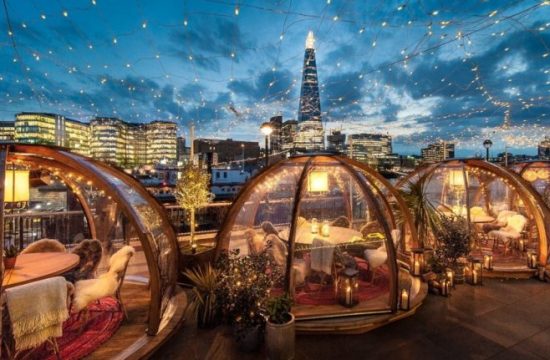Living in a motorhome for the past year has given us a unique perspective on the RV lifestyle. Before embarking on this adventure we had, of course, read up on what to expect, but we discovered life on the road was quite different from what our research had led us to believe.
Many of the most common RVing concerns have been addressed in Technomadia’s ebook Answers to the Common Excuses to Not Travel Full-Time (e.g. how do you maintain community on the road, are we going to be able to make everything work out financially, and what the heck do we do with all our junk!?), but we found a ton of other advantages and drawbacks that we hadn’t expected. Here’s a sampling:
~~~~~~~~~~~~~~
The Energy Issue
We work on our laptops a lot. In fact, it wouldn’t be much of an exaggeration to say that our Macs (Minerva and Godric) are more or less just an extension of our wrists, so of course finding a way to power them was a huge priority for us.

We also had a generator available to supplement our batteries and charge them as necessary, but it was noisy and stinky and we were (perhaps somewhat irrationally) loathe to use it much.
These restrictions meant that we ended up spending way more time at RV parks and campgrounds than we had initially anticipated, because we just couldn’t get enough work done while boondocking. Paying campground fees every night was definitely a bummer, but we often found it to be the best option since it enabled us to work a full day.
Spending a week boondocking in the wilds sounded so appealing when we started, but unfortunately it was never really a feasible option for us. Instead of wilderness, our drycamping consisted of hopping between public libraries and coffee shops so we could use their internet and power outlets while still having a free place to park at night. Such an existence was, as you can imagine, quite harried and decidedly unproductive.
Suggestions: Two words: SOLAR. POWER. If you work online and want to live in a motorhome, put some serious consideration into rigging up a solar array. They can be quite pricy, but if it enables you to work more (thus making money) and boondock more (thus saving money), then in many cases solar power is well worth the initial cost.
Location Limitations
If your goal is to explore national parks or the rural countryside, you’ll find an abundance of places to park your RV. But if, like us, you prefer to explore cities, then trying to find a place to stay will probably, at some point or another in your trip, leave you screaming obscenities in frustration.
Most large cities have at least one RV park (NYC even has one that boasts a view of the Statue of Liberty!), but they’re frequently full, often prohibitively expensive, and always pack you in next to your neighbors like sardines in a can.
We prefer to exist in the heart of a city – frequenting coffee shops, going out dancing, leisurely walking around the various districts – so having to drive thirty minutes in from the nearest affordable campground has seriously hampered our mojo. We ran into this problem in almost all the urban area we visited (Boston, Miami, and New Orleans are a few of the more egregious examples), and it prevented us from exploring them as fully as we would have liked.
Suggestions: Buy a smaller RV (in the 25-foot range) so you can perhaps fit on urban streets… though watch out for street cleaning and local ordinances! If your rig is more ample in size, I would seriously suggest towing a separate vehicle for those times when you’re eager to explore a dense area but want to avoid accidentally taking out a couple dozen parked cars while maneuvering the streets.
Maintenance Madness
Mayhem was the most expensive purchase we’ve ever made, so we wanted to keep it in perfect condition. Of course that’s impossible with a motorhome (even one purchased new!), though, and the stress of maintaining such a relatively-flimsily-constructed house nearly gave us ulcers. We felt personally affronted when anything went wrong — every small leak or random issue that needed to be fixed was taken as a direct indignity!
Like all owners, we wanted to preserve our new home’s pristine condition and do everything we could to maintain its value. We hadn’t fully prepared ourselves for the reality of life on the road, and we struggled to come to terms with these universal truths: screws will loosen, bikes will jab holes in the wall, and branches will jump out and attack the roof when you’re just trying to park — regardless of what you do.
Suggestions: Learn to be handy, don’t buy your RV new, and adopt a relaxed attitude about your new home. I guarantee you that stuff will go wrong – whether it’s scraping up your rig, facing avoidable black-tank catastrophes, or tracking down mystery leaks – so it’s all in the way you deal with it. And at the end of the day our RV was actually still in really good shape, so it’s worth keeping in mind that in the larger sense things that seem terrible at the time might not actually be that big of a deal.
The Urge to Hustle
Okay, so this one was entirely our fault, but instead of entering this adventure with a completely unconstrained timetable we started out anticipated living in Mayhem for only a year (or maybe two, tops).
We were open to extending that duration if we felt so compelled, but just having a time frame in mind restricted how comfortable we felt rambling leisurely about with nary a concern or destination. We felt, perhaps somewhat naively, that we didn’t have the luxury to take it slow.
Additionally, we’ve struggled over this past year to strike a good balance between working full-time and traveling full-time, and in the end I don’t know that we ever truly found it. This imbalance, perhaps more than any other aspect of traveling full-time in an RV, was a major contribution to our eventual burn-out.
Suggestions: Slow the heck down! You don’t have to see and do everything in one trip. And if you acknowledge the merits of that advice and yet still willfully ignore it like us, then just know that there’s always time to sleep later in life. 😉
~~~~~~~~~~~~~~
Not everything about living in a motorhome was bad, though! In fact, despite the many disadvantages I would say the rewards of full-time RV travel are well worth it.
Home is Where You Are
You seriously can’t overestimate the beauty of having your own home with you while traveling. It’s your own space, your own bed, and your own fully-stocked kitchen! You never have to unpack or live out of a suitcase. And you can sleep anywhere you want.
Traveling via motorhome takes away a lot of what’s stressful about travel… and living in a motorhome allows you to travel as you please.
Highly Cost-Effective
Having an RV as your permanent residence can actually be quite cheap! If you want to stay in one location, it’s not unheard of to find monthly rent at some pretty nice RV parks to be $500 or less. Plus, you’re able to move from state to state should you wish, so property taxes may not apply depending on where you stay. However, be sure to do your research before using a tax refund estimator to file taxes, as any errors could lead to an IRS red flag.
Even if you’re constantly on the road, though, it can still be way cheaper than traditional travel. You don’t have to pay for flights or eating all your meals at restaurants. Decent hotels are usually around $70-$100, so it’s possible to save loads on nightly accommodations since, as we explain in our article on the travel costs of living in an RV, it’s very feasible to pay $30 or less per night. We’re also familiar with tons of full-time RVers who rarely (if ever) pay overnight fees at all; instead they stealth park, stay with friends, or go the boondocking route.
Freedom and Flexibility
For us, this was the greatest part of living in an RV; you truly have the freedom to travel anywhere in the U.S. (or, if you’re adventurous, beyond).
This seems pretty obvious — your house has wheels, of course you have flexibility! — but on a day-to-day basis the freedom to change our plans at the last minute was incredibly freeing. There were times when we’d stop for lunch at a rest area partway to our destination, watch a show and play with Koa, then decide we were done for the day.
Don’t want to drive anymore? Not a problem! You’re already home, after all, so you can just stay where you are until you’re ready to hit the road again.
~~~~~~~~~~~~~~
Now that our time living in Mayhem is over, friends and acquaintances are all asking us “was it worth it?” Our answer is an unequivocal YES. Even with all the issues, the frustrations, and the annoying hassles of living in a motorhome, we’ve had an incredibly fun year.
Would we do it again? Probably not… at least not in the same format, and not any time soon. Kali dreams about creating a huge bus conversion like this one at some point, but for now those are vague thoughts about the distant future.
In the meantime we’ll continue our travels, just in a different way. We’ve learned that RV life is perhaps not the best mode of long-term travel for us right now, but of course we’re keeping our options open. And who knows what the future may hold… we haven’t ruled out the possibility of getting a camper van in New Zealand or a small motorhome for easy exploration of the E.U.!
What about you? If you live in an RV, what are some of the unexpected benefits and drawbacks you’ve experienced? If not, what are your dreams or worries about the RV lifestyle?
















